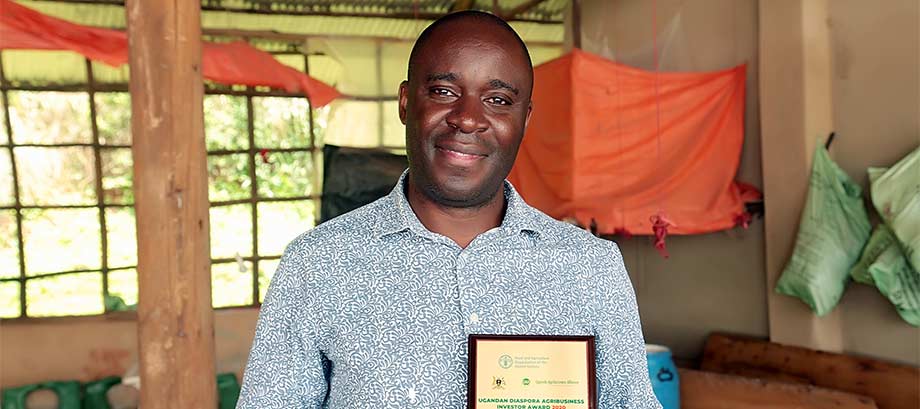Tapping into diaspora and migrant communities to promote rural development – the story of Andrew Bamugye
Diaspora communities can be a powerful force for the development of their countries of origin – not only through remittances but also through the promotion of trade, investments, research, innovation and knowledge/technology transfer. Creating an enabling environment for diaspora to engage in the development of their country of origin is key to maximizing the impact of their activities. To encourage this, FAO launched the first Ugandan Diaspora Agribusiness Investor Award to celebrate and further empower successful diaspora agri-entrepreneurs who contribute to employment creation in rural areas of Uganda. Diaspora winners were given the opportunity to attend the Ugandan Diaspora Agri-food Investment Conference to discuss the challenges of investing in agribusiness, present their businesses to an audience of state and non-state actors, and connect with Ugandan youth agri-entrepreneurs. They are benefitting from extensive media exposure, participation in national agribusiness exhibitions, access to a network of agri-food service providers and tailored coaching provided by the Ugandan Agribusiness Alliance.
Andrew Bamugye, a Ugandan national who now lives in Zimbabwe, is one of the diaspora winners. Judges commended his successful business model, impressive turnover and strong commitment to employing young people. In 2008, Andrew left Uganda and moved initially to South Africa, then to Zambia and most recently to Zimbabwe to work for the Trade and Development Bank. However, he always felt a hankering for his home country, and after three years of being abroad, he was inspired to use some of the skills he learned to set up a new business in Uganda, providing employment and knowledge opportunities for young people. Now, he is the Managing Director of Destiny Farms Limited, a poultry farm in Buloba, just outside the capital of Kampala.
“I studied poultry business models deeply and leveraged them to start Destiny Farms Limited,” Andrew explains. “We had a plot of land of two acres in Uganda that we could start with. So, in 2011, I registered the business with my wife and, with the support of my elder brother in operations, we took off!”
Andrew’s farm holds 25 000 broiler chickens that produce over 150 000 broilers per year. Using the methods he learned abroad, the company’s sales and profits have almost doubled in the last three years. He has expanded to employing 11 people under the age of 30, and he has worked hard to serve as a role model and impart an entrepreneurial mindset, helping his staff improve their business skills.
Andrew is committed to inspiring other Ugandan diaspora and youth agri-entrepreneurs, helping to boost the agriculture sector in his home country. From Zimbabwe, he offers others his technical support on the poultry sector and business model development through online platforms and social media. Now, he is planning to launch an agri-consulting firm to encourage others who have moved abroad to bring their skills and knowledge back to Uganda and invest in agriculture.
With Andrew’s business as a clear example, knowledge and investment from diaspora can have a big impact on improving skills and generating employment opportunities in countries around the world. As a sign of the increasing recognition of diaspora contributions, in 2019, 73 percent of governments globally reported having a dedicated department or ministry for diaspora engagement, citizens abroad or overseas employment. In sub-Saharan Africa, this is true of 91 percent of governments, showing just how important diaspora are to their home countries.
“Agriculture is a big business and an engine of economic growth,” Andrew says, and tapping into the knowledge and resources of diaspora is a key way to leverage this.
Through projects that bring together national public and private-sector actors with diaspora to promote investment opportunities in agriculture and food systems, FAO helps generate local employment opportunities and promote rural development.
Programme
3. Migration and fragility
Subprogramme
Strengthening capacity to harness positive effects of migration
(FMM/GLO/133/MUL)
Share this page

